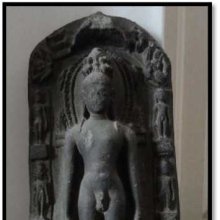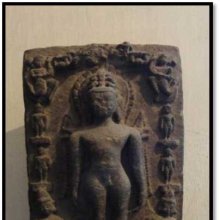Vallari, Vallarī: 18 definitions
Introduction:
Vallari means something in Hinduism, Sanskrit, Buddhism, Pali, Jainism, Prakrit, Hindi, biology, Tamil. If you want to know the exact meaning, history, etymology or English translation of this term then check out the descriptions on this page. Add your comment or reference to a book if you want to contribute to this summary article.
Images (photo gallery)
In Hinduism
Ayurveda (science of life)
Nighantu (Synonyms and Characteristics of Drugs and technical terms)
Source: Wisdom Library: Raj NighantuVallarī (वल्लरी) refers to the “florescence” of a tree, as mentioned in the second chapter (dharaṇyādi-varga) of the 13th-century Raj Nighantu or Rājanighaṇṭu (an Ayurvedic encyclopedia). The Dharaṇyādi-varga covers the lands, soil, mountains, jungles and vegetation’s relations between trees [viz., Vallarī] and plants and substances, with their various kinds.
Note: Vallarī is also a technical term for “creepers” and “climbers”.

Āyurveda (आयुर्वेद, ayurveda) is a branch of Indian science dealing with medicine, herbalism, taxology, anatomy, surgery, alchemy and related topics. Traditional practice of Āyurveda in ancient India dates back to at least the first millenium BC. Literature is commonly written in Sanskrit using various poetic metres.
Biology (plants and animals)
Source: Wisdom Library: Local Names of Plants and DrugsVallari [വല്ലാരി] in the Malayalam language is the name of a plant identified with Enicostema axillare (Poir. ex Lam.) A.Raynal from the Gentianaceae (Gentian) family. For the possible medicinal usage of vallari, you can check this page for potential sources and references, although be aware that any some or none of the side-effects may not be mentioned here, wether they be harmful or beneficial to health.
Vallari in the Tamil language, ibid. previous identification.
Source: Google Books: CRC World Dictionary (Regional names)1) Vallari in India is the name of a plant defined with Centella asiatica in various botanical sources. This page contains potential references in Ayurveda, modern medicine, and other folk traditions or local practices It has the synonym Hydrocotyle ficarioides Lam. (among others).
2) Vallari is also identified with Enicostema axillare It has the synonym Slevogtia maritima Dalzell (etc.).
3) Vallari is also identified with Hymenodictyon orixense It has the synonym Exostema philippicum Blanco (etc.).
4) Vallari is also identified with Plumbago zeylanica It has the synonym Plumbago scandens L. (etc.).
5) Vallari is also identified with Trigonella foenum-graecum It has the synonym Medicago tibetana (Alef.) Vassilcz. (etc.).
Example references for further research on medicinal uses or toxicity (see latin names for full list):
· Species Plantarum (1753)
· Grassland of China (2000)
· Familles des Plantes (1763)
· Contributions from the United States National Herbarium (1900)
· Journal of Ethnopharmacology (2003)
· Enumeratio Plantarum Guatemalensium (1889)
If you are looking for specific details regarding Vallari, for example health benefits, extract dosage, chemical composition, pregnancy safety, diet and recipes, side effects, have a look at these references.

This sections includes definitions from the five kingdoms of living things: Animals, Plants, Fungi, Protists and Monera. It will include both the official binomial nomenclature (scientific names usually in Latin) as well as regional spellings and variants.
Languages of India and abroad
Pali-English dictionary
Source: BuddhaSasana: Concise Pali-English Dictionaryvallarī : (f.) a bunch; a cluster.
Source: Sutta: The Pali Text Society's Pali-English DictionaryVallarī, (f.) (cp. Class. Sk. vallarī, Halāyudha II. 30) a branching footstalk, a compound pedicle Abhp 550. The word is found in BSk. in meaning of “musical instrument” at Divy 315 and passim. (Page 603)

Pali is the language of the Tipiṭaka, which is the sacred canon of Theravāda Buddhism and contains much of the Buddha’s speech. Closeley related to Sanskrit, both languages are used interchangeably between religions.
Sanskrit dictionary
Source: DDSA: The practical Sanskrit-English dictionaryVallari (वल्लरि) or Vallarī (वल्लरी).—f. [vall-ari vā ṅīp]
1) A creeping plant; अनपायिनि संश्रयदुमे गजभग्ने पतनाय वल्लरी (anapāyini saṃśrayadume gajabhagne patanāya vallarī) Kumārasambhava 4.31; तमोवल्लरी (tamovallarī) Mālatīmādhava (Bombay) 5.7.
2) A branching foot-stalk; चित्रश्रीरलमलकाग्र- वल्लरीभिः (citraśrīralamalakāgra- vallarībhiḥ) Śiśupālavadha 8.56.
3) Trigonella Foenum Graecum (Mar. methī).
Derivable forms: vallariḥ (वल्लरिः).
Source: Cologne Digital Sanskrit Dictionaries: Edgerton Buddhist Hybrid Sanskrit DictionaryVallarī (वल्लरी).—once °ri (1) (= AMg. id.) a musical instru-ment, according to Tibetan three-stringed lute (vīṇā): Mahāvyutpatti 5019 = Tibetan pi-waṅ (vīṇā) rgyud gsum pa (three-stringed); veṇu- vallari-sughoṣakā Divyāvadāna 221.24 (only case written °ri); always in [compound] lists of instruments, Divyāvadāna 315.12; 317.23; 320.6; 459.4; (2) a stalk or panicle of rice-kernels: śāli-°ryo Mūla-Sarvāstivāda-Vinaya ii.61.12, Tibetan ḥbras kyi (of rice) sñe ma (regularly ear of corn); = śīrṣan, q.v. (Cf. Childers and [Pali Text Society’s Pali-English Dictionary] s.v. vallarī, citing a Pali Lex. with meaning a compound pedicle.)
Source: Cologne Digital Sanskrit Dictionaries: Shabda-Sagara Sanskrit-English DictionaryVallari (वल्लरि).—f. (-riḥ or rī) 1. A compound pedicle. 2. A creeping or twining plant. E. vall to cover, aran aff, ṅīp optionally added.
Source: Cologne Digital Sanskrit Dictionaries: Benfey Sanskrit-English DictionaryVallari (वल्लरि).—vallarī, f. 1. A creeping plant, [Pañcatantra] 229, 16 (ri). 2. A compound pedicle.
Vallari can also be spelled as Vallarī (वल्लरी).
Source: Cologne Digital Sanskrit Dictionaries: Cappeller Sanskrit-English DictionaryVallari (वल्लरि).—[feminine] a creeping or twining plant.
--- OR ---
Vallarī (वल्लरी).—[feminine] a creeping or twining plant.
Source: Cologne Digital Sanskrit Dictionaries: Monier-Williams Sanskrit-English Dictionary1) Vallari (वल्लरि):—[from vall] f. a creeper, any climbing or creeping plant (also [figuratively] applied to curled hair), [Kāvya literature; Varāha-mihira’s Bṛhat-saṃhitā] etc.
2) [v.s. ...] a branching foot-stalk, compound pedicle, [cf. Lexicographers, esp. such as amarasiṃha, halāyudha, hemacandra, etc.]
3) [v.s. ...] Trigonella Foenum Graecum, [Bhāvaprakāśa]
4) [v.s. ...] a kind of metre, [Colebrooke]
5) Vallarī (वल्लरी):—[from vallari > vall] f. a creeper, any climbing or creeping plant (also [figuratively] applied to curled hair), [Kāvya literature; Varāha-mihira’s Bṛhat-saṃhitā] etc.
6) [v.s. ...] a branching foot-stalk, compound pedicle, [cf. Lexicographers, esp. such as amarasiṃha, halāyudha, hemacandra, etc.]
7) [v.s. ...] Trigonella Foenum Graecum, [Bhāvaprakāśa]
8) [v.s. ...] a kind of metre, [Colebrooke]
9) [v.s. ...] (only rī) a [particular] musical instrument, [Divyāvadāna]
10) Vallārī (वल्लारी):—[from vallāra > vall] f. (in music) a [particular] Rāgiṇī, [Saṃgīta-sārasaṃgraha]
Source: Cologne Digital Sanskrit Dictionaries: Yates Sanskrit-English DictionaryVallari (वल्लरि):—[(raḥ-rī)] 2. 3. f. A compound pedicle; a creeper.
Source: DDSA: Paia-sadda-mahannavo; a comprehensive Prakrit Hindi dictionary (S)Vallarī (वल्लरी) in the Sanskrit language is related to the Prakrit word: Vallarī.
[Sanskrit to German]
Sanskrit, also spelled संस्कृतम् (saṃskṛtam), is an ancient language of India commonly seen as the grandmother of the Indo-European language family (even English!). Closely allied with Prakrit and Pali, Sanskrit is more exhaustive in both grammar and terms and has the most extensive collection of literature in the world, greatly surpassing its sister-languages Greek and Latin.
Hindi dictionary
Source: DDSA: A practical Hindi-English dictionaryVallarī (वल्लरी):—(nf) a creeper, creeping plant.
...
Prakrit-English dictionary
Source: DDSA: Paia-sadda-mahannavo; a comprehensive Prakrit Hindi dictionaryVallarī (वल्लरी) in the Prakrit language is related to the Sanskrit word: Vallarī.
Prakrit is an ancient language closely associated with both Pali and Sanskrit. Jain literature is often composed in this language or sub-dialects, such as the Agamas and their commentaries which are written in Ardhamagadhi and Maharashtri Prakrit. The earliest extant texts can be dated to as early as the 4th century BCE although core portions might be older.
Kannada-English dictionary
Source: Alar: Kannada-English corpusVallari (ವಲ್ಲರಿ):—
1) [noun] any creeper or climbing plant; a climber.
2) [noun] a number of things of the same sort gathered together or growing together; bunch.
Kannada is a Dravidian language (as opposed to the Indo-European language family) mainly spoken in the southwestern region of India.
Tamil dictionary
Source: DDSA: University of Madras: Tamil LexiconVallari (வல்லரி) noun < vallarī.
1. Budding shoot; தளிர். (சூடாமணிநிகண்டு) [thalir. (sudamaninigandu)]
2. Green fruit; பசுங்காய். (சூடாமணிநிகண்டு) [pasungay. (sudamaninigandu)]
3. Cluster of fruit; காய்க்குலை. (உரிச்சொல்நிகண்டு) [kaykkulai. (uricholnigandu)]
4. Bunch of flowers; பூங்கொத்து. (திவா.) [pungothu. (thiva.)]
5. Creeper; கொடி. ((சங்கத்தகராதி) தமிழ்சொல்லகராதி) [kodi. ((sangathagarathi) thamizhsollagarathi)]
Tamil is an ancient language of India from the Dravidian family spoken by roughly 250 million people mainly in southern India and Sri Lanka.
See also (Relevant definitions)
Starts with: Vallarika, Vallarikkoti, Vallaris indecora, Vallaris solanacea.
Ends with (+11): Amaravallari, Amritavallari, Angaravallari, Asheshakulavallari, Ashokavallari, Candravallari, Cantiravallari, Chandravallari, Comavallari, Dhyanavallari, Gadyavallari, Gandhavallari, Ikshuvallari, Indravallari, Kadambavallari, Kakavallari, Khadiravallari, Kunjavallari, Mantravallari, Nagavallari.
Full-text (+40): Somavallari, Angaravallari, Candravallari, Bhadravalli, Bhumimanda, Ashtapadika, Nagavallari, Gandhavallari, Amaravallari, Ikshuvallari, Indravallari, Vallaris solanacea, Giant vallaris, Phulkati, Mesau-ripak, Haparmali, Niu zi hua, Mani pushpan, Da niu zi hua, Ullari.
Relevant text
Search found 13 books and stories containing Vallari, Vallarī, Vallārī; (plurals include: Vallaris, Vallarīs, Vallārīs). You can also click to the full overview containing English textual excerpts. Below are direct links for the most relevant articles:
Jain Remains of Ancient Bengal (by Shubha Majumder)
Caubisi type of Ṛṣabhanātha sculptures < [Chapter 6 - Iconographic Study of Jaina Sculptural Remains]
Planetary Deities type of Ṛṣabhanātha Sculptures < [Chapter 6 - Iconographic Study of Jaina Sculptural Remains]
Pañca-tīrthika type of Ṛṣabhanātha sculptures < [Chapter 6 - Iconographic Study of Jaina Sculptural Remains]
Śrī Śrī Rādhā-kripa-kaṭākṣa-stava-rāja
Sahitya-kaumudi by Baladeva Vidyabhushana (by Gaurapada Dāsa)
Text 4.64 < [Chapter 4 - First-rate Poetry]
A History of Indian Philosophy Volume 4 (by Surendranath Dasgupta)
Part 5 - Some Companions of Caitanya < [Chapter XXXII - Caitanya and his Followers]
Indian Medicinal Plants (by Kanhoba Ranchoddas Kirtikar)
40. Tinospora cordifolia, Miers. < [Menispermaceae (moonseed family)]
Mahabharata (English) (by Kisari Mohan Ganguli)
Section LIV < [Anusasanika Parva]

